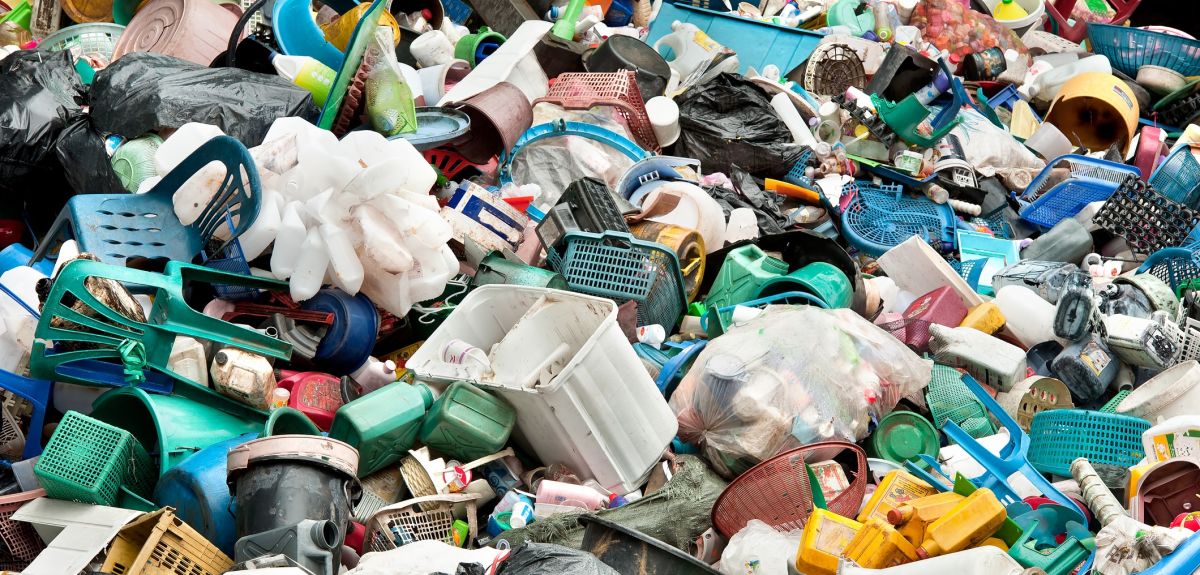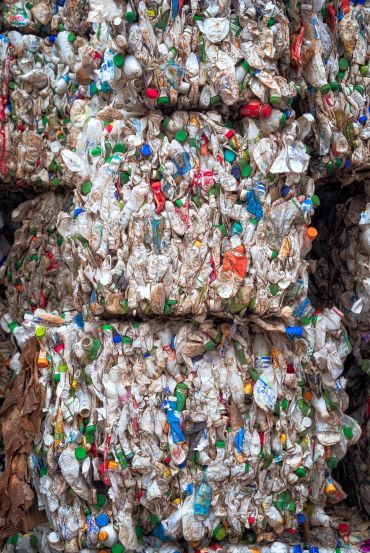
Oxford scientists launch ambitious roadmap for a circular carbon plastics economy
Researchers from the Oxford Martin Programme on the Future of Plastics, University of Oxford, have outlined ambitious targets to help deliver a sustainable and net zero plastic economy. In a paper published this week in Nature, the authors argue for a rethinking of the technical, economic, and policy paradigms that have entrenched the status-quo, one of rising carbon emissions and uncontrolled pollution.
 In 2019, only 9% of plastics globally were recycled. Image credit: Biskariot, Getty Images.
In 2019, only 9% of plastics globally were recycled. Image credit: Biskariot, Getty Images.The authors analyse the current and future global plastics system, proposing technical, legal, and economic interventions from now until 2050 to allow it to transition to net zero emissions and to reduce other negative environmental impacts. The study includes a future scenario centred on four targets:
- Reducing future plastics demand by one half, substituting and eliminating over-use of plastic materials and products.
- Changing the way plastics are manufactured to replace fossil fuels as the hydrocarbon source to use only renewably raw materials, including waste biomass and carbon dioxide.
- For plastics which are recoverable, maximising recycling very significantly, targeting 95% recycling of those materials which are retrievable from wastes.
- Integrating plastic manufacturing and recycling with renewable power and minimising all other negative environmental impacts, including of additives.
The authors emphasise the need for concerted action across all four target areas to ensure the global plastics systems curbs its climate impacts and meets UN Sustainable Development Goals.
The plastic waste problem requires government and international legislation, fast technical innovation and a cohesive approach. It can be solved but we must act together and quickly. The UN international plastics treaty provides the world with a key opportunity – it is a very exciting chance to fundamentally change the way we make, use and manage end of life for future plastics. We must not miss the opportunity.
Professor Charlotte Williams, Department of Chemistry, University of Oxford’s Department
Lead author Professor Charlotte Williams (Department of Chemistry, University of Oxford) said: ‘We need plastics and polymers, including for future low emission technologies like electric vehicles, wind turbines, and for many essential everyday materials. Our current global plastics system is completely unsustainable, and we need to be implementing these series of very bold measures at scale, and fast. This is a solvable problem but it needs coherent and combined action, particularly from chemical manufacturers.’
To successfully transition the plastics system, the authors set out principles to ensure ‘smart materials design’ and differentiate between plastics which are recoverable and irretrievable after use, noting that there is not a one size fits all solution. Rather, the authors propose careful use of the design principles to help select the optimum production methods and appropriate use of resources, deliver the required performances, ensure waste management, and minimise broader environmental impacts. A timeline of technical-economic-policy and legal interventions helps readers focus on the actions needed to reach net zero emissions by 2050.
‘The time for action has arrived, we cannot afford to wait any longer,’ study co-author Fernando Vidal, Postdoctoral Researcher in Chemistry at POLYMAT in Spain and former Oxford Martin School Fellow on the Future of Plastics concluded. ‘We must change our concepts around the way we make, use, and dispose of plastics, otherwise we risk perpetuating this problem. The upcoming UN Global Plastic Treaty is the opportunity to make a lasting change in the right direction.’
The challenge is enormous, but we present a roadmap to transform the whole system, including through the smart design of plastics, economic and legal interventions, and a shift away from overconsumption.
Professor Cameron Hepburn, Smith School of Enterprise and the Environment, University of Oxford.
Study co-author Cameron Hepburn, Battcock Professor of Environmental Economics at the Oxford’s Smith School of Enterprise and the Environment, said: ‘The problem is that plastics, while contributing hugely to global pollution and greenhouse gas emissions, are extraordinarily useful. Our research finds that creating a circular economy for plastics in order to reduce their negative impacts is possible, but only if we can reduce future demand by half, switch to renewable plastics that aren’t made from fossil fuels, recycle 95% of what’s left, and minimise environmental impacts at every step of the process.
Professor Williams’ research group is actively engaged in developing innovative solutions to meet this goal. A particular focus is to investigate techniques that can manufacture plastics from abundant renewable resources (such as carbon dioxide, biomass or industrial wastes), rather than petrochemicals.
She said: ‘I undertook part of my training 20 years ago in the USA where they were making the first commercial bio-derived plastics. Seeing how well these materials performed was very inspiring. This led me to explore how to make sure these ‘alternative’ materials meet all the property specifications and application needs we have, but with a designed end-life fate and energy efficiency throughout their lifecycles.’
The paper ‘Designing a Circular Carbon and Plastics Economy for a Sustainable Future’ has been published in Nature.
 Expert Comment: Church-to-mosque conversions grab headlines, but is funding the real crisis?
Expert Comment: Church-to-mosque conversions grab headlines, but is funding the real crisis?
 Expert Comment: Four years of full-scale war and Ukrainian resistance continues
Expert Comment: Four years of full-scale war and Ukrainian resistance continues
 Oxford and Liverpool join forces to tackle global challenges
Oxford and Liverpool join forces to tackle global challenges
 Unlocking more sustainable futures with green chemistry
Unlocking more sustainable futures with green chemistry New study shows that most plastic debris on Seychelles beaches comes from far-off sources
New study shows that most plastic debris on Seychelles beaches comes from far-off sources
 Oxford expert advises on the use of biodegradable plastics
Oxford expert advises on the use of biodegradable plastics